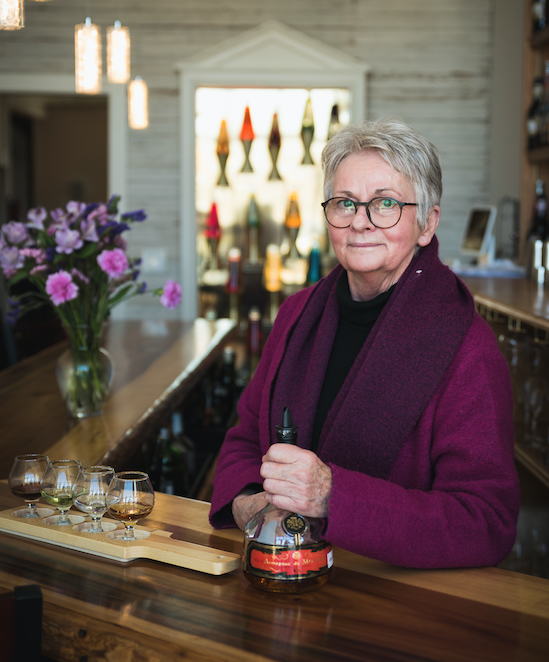If the beverage industry’s leading lights are prognosticating accurately, 2019 will be the year of brandy’s resurgence as a spirit of choice. Seven out of 22 spirits writers queried for Adam Morganstern’s Dec. 30 article for Forbes titled “The Best Spirits and Cocktails for 2019” name brandy or one of its specific varieties (Armagnac, cognac, etc.) as the premier spirit to watch in 2019. And in “19 for ’19: Cocktail & Spirits Trend Survey,” drinks industry authority Claire Sprouse of the online resource Tin Roof Drink Community tells the editors of neatpour.com, “Every year I say that brandy will really take off, but I think it might actually happen in 2019!”
Brenda Coates agrees with those forecasts. In May 2018, she opened The Brandy Bar in Hendersonville’s historic Seventh Avenue Depot district. In keeping with North Carolina’s laws concerning bars, membership is required; Coates says that more than 1,400 people have joined over the last eight months.
The variety that exists within the brandy category of spirits isn’t widely known by the general public. Brandy is sometimes thought of as a bottom-shelf product. But within the world of brandy, there is a wide array of choices; the finest have a subtlety that rivals the best from any spirit category.
Relatively few bars in Western North Carolina stock more than a handful of brandies; uniquely, Coates’ bar features nearly four dozen varieties. And brandy production is quite limited in the state, with only three distilleries currently producing the spirit.
Copper stills have been found to produce the best results for brandy distillation. “Copper adds to the flavor of the fruit,” Coates says. And brandy often receives much less filtration than grain spirits such as vodka; less filtration means more flavor.
“Strictly speaking,” writes Stuart Walton in The Bartender’s Guide to Cocktails & Mixed Drinks, “the term brandy applies to any grape-based spirit distilled from wine.” But in practice, any spirit distilled from fruit — apples, pears, raspberries and so on — can be considered a brandy.
But brandy’s origins lie in grape wine. Walton explains that 17th-century traders found that distilling wine before shipping reduced its weight and volume, making it cheaper and easier to transport. The idea was to reconstitute the wine at journey’s end, but intrepid drinkers soon found that the higher-alcohol product — stored in wooden casks — developed charms of its own.
The first brandies were likely made in France’s Armagnac region in the early 1300s. The best-known variety, cognac, began production in the early 1700s, and an internationally recognized rating system (V.S., V.S.O.P., XO) defines ages and grades of those spirits. Two of the most popular brandies are cognacs from Hennessy and Courvoisier; both are available locally.
Today brandies are made all over the globe. One regional specialty is grappa from Italy. Another is pisco, a delightful South American spirit made from moscato grapes and not aged in wood. We have a special affinity for Capel pisco, which can sometimes be found locally at ABC stores. It has a complex character and is ideal for sipping.
Other spirits fall under the loose category of brandy. Slivovitz is made from plums (we’ll explore Eastern European spirits in a future issue). Made from apples, applejack is among the most popular American brandies. Laird’s, maker of American apple brandies, is the oldest distillery in the United States.
Western North Carolina has its own brandy backstory. Coates explains that Dr. George Fletcher, 1880s postmaster of the town that bears his name, “made his own applejack to serve at the tavern he had.” The doctor’s method of making the spirit was simple and crude, yet effective. “They would ferment apple juice and then set it out on the porch,” Coates explains. The water portion would freeze, leaving behind 120-proof liquid. “It was powerful stuff,” says Coates with a chuckle.
Brandy benefits greatly from aging in oak barrels, but highly aged brandies are generally only available from European distillers. “I just don’t see American [distillers] putting any profit aside for seven to 40 years,” Coates says. “It’s just not going to happen. We [Americans] like a turnaround; we’ve got to have a return on our investment.” But even younger brandies exist in pleasing variety.
North Carolina drinkers have limited options, though. Coates notes that of the nearly 50 brandies on the shelves at The Brandy Bar, 75 percent are special order. Widely available and relatively inexpensive brands that earn Coates’ approval include Copper & Kings, distilled in Kentucky. Beyond serving straight brandies in traditional snifter glasses, Coates’s bar specializes in brandy-based spins on traditional cocktails (see recipe).
Those who haven’t tried brandy often hold incorrect assumptions about it. Coates laughs when she recalls a conversation with a fellow diner at an area restaurant. “Have you ever had brandy?” she asked the man. He said no, “because it’s too sweet.” She laughed and replied, “Then you’ve never had brandy.”



Before you comment
The comments section is here to provide a platform for civil dialogue on the issues we face together as a local community. Xpress is committed to offering this platform for all voices, but when the tone of the discussion gets nasty or strays off topic, we believe many people choose not to participate. Xpress editors are determined to moderate comments to ensure a constructive interchange is maintained. All comments judged not to be in keeping with the spirit of civil discourse will be removed and repeat violators will be banned. See here for our terms of service. Thank you for being part of this effort to promote respectful discussion.